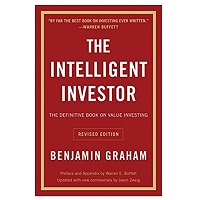The Intelligent Investor by Benjamin Graham EPUB & PDF – eBook Details Online
- Status: Available for Free Download
- Author: Benjamin Graham, Jason Zweig, Warren E. Buffett (Collaborator)
- Publish Date: February 21, 2006
- Language: English
- Genre: Private Equity
- Format: PDF
- Size: 5.55 MB
- Pages: 640
- Price: Free
Investment versus Speculation: Results to
Be Expected by the Intelligent Investor
Investment versus Speculation
What do we mean by “investor”? Throughout this book the
term will be used in contradistinction to “speculator.” As far back
as 1934, in our textbook Security Analysis,1 we attempted a precise
formulation of the difference between the two, as follows: “An
investment operation is one which, upon thorough analysis promises safety of principal and an adequate return.
Operations not meeting these requirements are speculative.”
While we have clung tenaciously to this definition over the
ensuing 38 years, it is worthwhile noting the radical changes that
have occurred in the use of the term “investor” during this period.
After the great market decline of 1929–1932 all common stocks
were widely regarded as speculative by nature. (A leading authority stated flatly that only bonds could be bought for investment.
2) Thus we had then to defend our definition against the charge that
it gave too wide scope to the concept of investment.
Now our concern is of the opposite sort. We must prevent our
readers from accepting the common jargon which applies the term
“investor” to anybody and everybody in the stock market. In our
last edition we cited the following headline of a front-page article
of our leading financial journal in June 1962:18
Investment versus Speculation
SMALL INVESTORS BEARISH, THEY ARE SELLING ODD-LOTS SHORT
In October 1970 the same journal had an editorial critical of what it
called “reckless investors,” who this time were rushing in on the
buying side.
These quotations well illustrate the confusion that has been
dominant for many years in the use of the words investment and
speculation. Think of our suggested definition of investment given
above, and compare it with the sale of a few shares of stock by an
inexperienced member of the public, who does not even own what
he is selling, and has some largely emotional conviction that he
will be able to buy them back at a much lower price. (It is not irrelevant to point out that when the 1962 article appeared the market
had already experienced a decline of major size, and was now getting ready for an even greater upswing. It was about as poor a time
as possible for selling short.) In a more general sense, the later-used
phrase “reckless investors” could be regarded as a laughable contradiction in terms—something like “spendthrift misers”—were
this misuse of language not so mischievous.
The newspaper employed the word “investor” in these
instances because, in the easy language of Wall Street, everyone
who buys or sells a security has become an investor, regardless of
what he buys, or for what purpose, or at what price, or whether for
cash or on margin. Compare this with the attitude of the public
For More Read Download This Book
EPUB





